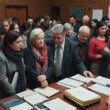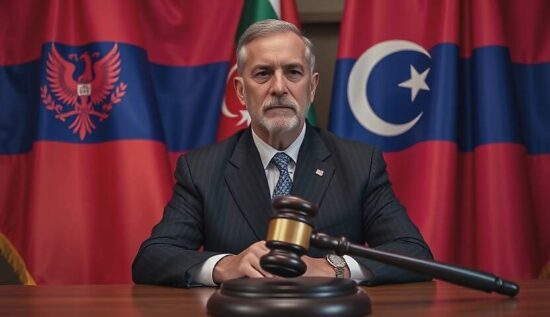A trial has begun in Azerbaijan against Ruben Wardanjan, a Russian-Armenian businessman, who led the de facto government of the disputed region of Nagorno-Karabakh from November 2022 to September 2023. Wardanjan is one of 15 former officials of the region, which is now under Azerbaijani control, to be charged.
Before the trial, Wardanjan’s family released a statement saying that he had not made any statements during the investigation, had not signed any interrogation protocols, and had not been allowed to familiarize himself with the case file. He maintains his innocence.
Born in 1968 in Yerevan, Wardanjan moved to Moscow at the age of 17 to study economics, where he settled and lived until 2022. He made a career as a broker and accumulated wealth when the Sberbank of Russia acquired his international brokerage firm in 2011. He later became a philanthropist.
In 2022, Wardanjan renounced his Russian citizenship to become involved in politics in the disputed region. After the region’s military defeat and occupation by Azerbaijan, he was arrested on September 27, 2023, while trying to flee to Armenia, and has been in custody since.
The case is controversial internationally. International law experts emphasize that Nagorno-Karabakh, in its pursuit of independence from 1994, the end of the war in Azerbaijan, to its defeat in the fall of 2023, represented a “stabilized de facto regime” and thus had limited international legal subjectivity. A prosecution of its officials under Azerbaijani national law would be a gross disregard for the right of peoples to self-determination enshrined in the UN Charter, particularly as “stabilized de facto regimes” can claim protection from military aggression and the right to self-defense.
In Wardanjan’s case, he had also taken on humanitarian administrative tasks in the region after a status for the disputed region was negotiated under Russian mediation between official Baku and official Yerevan.
The indictment charges Wardanjan and his co-defendants with crimes against the peace and humanity, war crimes, terrorism, financing of terrorism, murder, and the formation of illegal armed groups, apparently referring to the defense of Nagorno-Karabakh.
Almost 37 years ago, the then-Azerbaijan Autonomous Region of Nagorno-Karabakh unilaterally declared its secession from the Azerbaijani SSR, which was majority Armenian-populated. After the collapse of the Soviet Union and the armed conflict with Azerbaijan (1992-1994), the region existed for many years as an internationally unrecognized republic, with neither Armenia nor the international community recognizing its independence.
In September 2020, hostilities flared up in Karabakh through an Azerbaijani army offensive. Under Russian mediation, the two sides agreed to a ceasefire on the night of November 9. The Armenian side lost all the territories around Nagorno-Karabakh and a range of areas that had belonged to the Nagorno-Karabakh Autonomous Region during the Soviet era. Russian peacekeeping forces were stationed in the region.
In 2022, Yerevan and Baku began negotiating a future peace treaty under Russian, US, and EU mediation. By the end of May 2023, the Armenian Prime Minister Nikol Pashinyan stated that Armenia was ready to recognize Azerbaijan’s sovereignty within the Soviet-era borders, including Karabakh. Following a further offensive, Baku then occupied Karabakh in its entirety.





